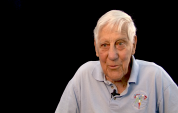7:03 | Paul Koshewa's B-24 had a barrage of markings on it from its time in the service, the most significant of these were the bombs on the side. He explains that these represented the missions that she flew, and he goes on to talk about getting shot in the leg during his sixth mission in Italy. (This interview made possible with the support of RICHARD SPEARS.)
Keywords : Paul Koshewa Italy B-24 Liberator Bomber shot down Golbranson aircraft commander Fossa Italy incendiary bombs morphine hospital gunnery officer Turret Gun

Paul Koshewa grew up in Louisville, Kentucky with a father who had served in the first world war. Naturally, Koshewa followed in his footsteps by serving in WWII, and even went on to serve in the Korean and Vietnam wars later on. He remembers undergoing basic training in Mississippi, followed by navigation school in Houston. He was fascinated by astronomy and therefore thought he'd make a good navigator, that is until he had a little trouble adapting to the European metric system. (This interview made possible with the support of RICHARD SPEARS.)
After his training at navigation school in Austin, Texas, Koshewa was ready to go over to Italy to assist the pilots. Here he explains the exact role of the plane he was assigned to, the B-24, and also talks about his first ever raid in Italy. (This interview made possible with the support of RICHARD SPEARS.)
Koshewa distinctly remembers what it felt like to get shot in the leg, as well as the purple heart and the distinguished flying cross he got as a result of enduring that experience. Nearing the end of his time overseas for World War II, he and his squadron were in the running to go to the pacific to help end the war. Fortunately, he never went because by the time he was ready to go over the war had already ended. It was finally time for him to go home. (This interview made possible with the support of RICHARD SPEARS.)
After a bit of relaxation back in the states after World War II, Koshewa was recalled in to report to Springfield, Massachusetts for the start of the Korean War. In Springfield, he had to undergo navigation refresher courses in preparation. His Korean missions mostly involved transportation, such as dropping off leaflets or agents behind the lines. Unlike in World War II, a lot of the times the enemy did not have radar to help them shoot down US planes. Because of this, Koshewa's missions became much easier to carry out. (This interview made possible with the support of RICHARD SPEARS.)
After his 75 missions in the Korean War, Koshewa got to go back to Atlanta and took up a teaching job from there. However, his service was far from over considering the Vietnam War had started going on. He was tasked with flight missions that took off from the states and made pit stops in Vietnam, Bermuda, Europe and the Pacific. All the while, he was still teaching at the local high school. Every so often a mission would take longer than expected and he would have to call out of his job for several days. During this time, there was a terrible plane accident that worried his family sick, but luckily Koshewa wasn't on that flight. (This interview made possible with the support of RICHARD SPEARS.)
After he was promoted to colonel, Koshewa was essentially forced to retire from the service. From there he went back to his normal life of teaching in Atlanta, and eventually got to revisit Italy many years later to see all the old war sites. These are his final thoughts about the wars he fought in and how he believes it affects today's youth and society. (This interview made possible with the support of RICHARD SPEARS.)